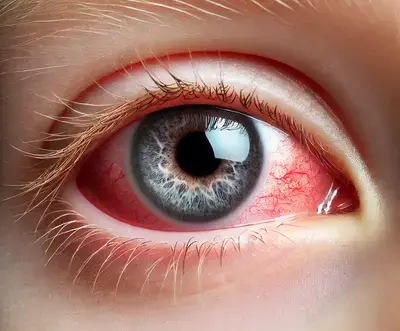As parents, we are always on the lookout for any signs of discomfort in our children. One particularly concerning issue is when one of your child’s eyes is persistently red and irritated. This can be alarming, but it’s important to know that many conditions that cause redness are treatable and not always severe. Let’s explore what might be happening and how you can help.
Common Causes of Red, Irritated Eyes

There are several reasons why one of your child’s eyes might be consistently red and uncomfortable. Below are some of the most common causes:
| Cause | Description |
|---|---|
| Conjunctivitis (Pink Eye) | Inflammation of the conjunctiva, usually caused by infection or allergies. Redness and discharge. |
| Allergies | Often seasonal, causing itching, redness, and watery eyes. One eye may be more affected. |
| Foreign Object | Dust, sand, or even an eyelash can irritate the eye, causing redness and discomfort. |
| Dry Eye Syndrome | Less common in children but can cause irritation and redness if the eye is not producing enough tears. |
| Blepharitis | Inflammation of the eyelids, leading to redness, irritation, and often crusting at the lashes. |
| Injury | A minor scratch or trauma can cause one eye to become red. Check for signs of injury or swelling. |
| Blocked Tear Duct | Common in infants, this condition can lead to redness and excessive tearing in one eye. |
Case Study: Emily’s Persistent Red Eye
Let’s look at an example. Emily, a 6-year-old, came home from school with one of her eyes noticeably red. At first, her parents thought it might be a minor irritation. However, after a few days, the redness persisted, and Emily began rubbing the eye frequently.
Concerned, her parents took her to an eye doctor. After a quick examination, it turned out that Emily had allergic conjunctivitis. The redness was a reaction to pollen, which was particularly high during that season. The doctor prescribed antihistamine eye drops and advised Emily’s parents to keep her indoors during peak pollen hours. Within a week, Emily’s symptoms had significantly improved.
Key Questions to Ask
When your child’s eye is red and irritated, asking the right questions can help determine the cause more quickly:
- When did the redness start? Was it sudden or gradual?
- Is the child rubbing the eye often? This could point to allergies or irritation.
- Is there discharge or crusting around the eye? A sticky discharge often suggests an infection like conjunctivitis.
- Is the child in pain, or is it just irritated? Pain might indicate an injury or foreign object.
- Does your child have allergies? If so, this could be the main culprit.
What to Do: First Aid for Red Eyes
Here’s a quick guide to addressing the issue at home before consulting a doctor:
- Rinse the eye with clean, lukewarm water if you suspect there’s a foreign object.
- Use a cold compress to reduce redness and swelling.
- Avoid rubbing – teach your child not to rub the affected eye, as this can worsen the irritation.
- Check for discharge – if there’s sticky discharge, gently clean it with a damp cloth.
- Over-the-counter eye drops – saline drops can provide relief from dryness or minor irritation.
When to See a Doctor
If the redness persists for more than a day or two, or if you notice other symptoms like pain, vision changes, or excessive discharge, it’s time to visit a doctor. Here’s a quick reference guide:
| Symptom | Action |
|---|---|
| Redness lasting more than 48 hours | See a doctor for evaluation |
| Pain or swelling in the eye area | Immediate medical attention needed |
| Sticky, yellow or green discharge | Likely infection; visit the doctor |
| Blurry vision or sensitivity to light | Requires urgent care |
Case Study: Max and the Sand in His Eye
Another real-life scenario involves Max, a curious 4-year-old, who was playing at the beach. When his parents noticed one of his eyes was red and watery, they thought he was just tired. The redness persisted, and Max started complaining about a “scratchy feeling” in his eye. A visit to the doctor revealed that Max had a small grain of sand lodged under his eyelid. After a quick rinse and some eye drops, the problem was resolved.
Prevention Tips for Parents
- Teach hygiene: Encourage your child not to touch their eyes, especially with dirty hands.
- Use protective eyewear during sports or dusty activities.
- Manage allergies: If your child is prone to seasonal allergies, speak to a doctor about preventative measures.
- Regular eye check-ups: Early detection of vision or eye health issues can prevent long-term problems.
Conclusion: Stay Calm and Be Proactive
While a red and irritated eye in your child can be worrying, most causes are treatable with simple interventions. By paying attention to your child’s symptoms and acting quickly, you can often resolve the issue before it becomes serious. If in doubt, always consult an eye doctor to ensure the best care for your little one.
Final Tip: Don’t forget to keep your child’s environment clean and their eyes protected. Small steps can go a long way in preventing eye irritation and ensuring their vision stays sharp.



